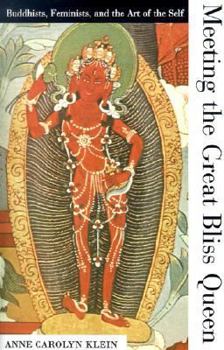Meeting the Great Bliss Queen: Buddhists, Feminists, and the Art of the Self
Select Format
Select Condition 
Book Overview
Despite the daunting barriers of geography and language that separate them, Buddhism and contemporary feminism have much to say to each other. Buddhist practices such as mindfulness (in which calm... This description may be from another edition of this product.
Format:Paperback
Language:English
ISBN:0807073075
ISBN13:9780807073070
Release Date:January 1996
Publisher:Beacon Press (MA)
Length:332 Pages
Weight:1.15 lbs.
Dimensions:0.8" x 6.1" x 9.0"
Customer Reviews
4 ratings
Not a new edition
Published by Thriftbooks.com User , 16 years ago
Just a technical note to say, from what I can tell this appears to be no different that the 1996 edition which is still available and much cheaper.
Just a start, but more than I've found elsewhere
Published by Thriftbooks.com User , 19 years ago
I would not recommend Klein's examination of the overlap and discrepancies between Indo-Tibetan Buddhist traditions and feminist and pomo feminist traditions to those looking for an introduction to any of those topics. However, I would recommend the book to anyone interested in the topics of self and emptiness in Buddhism or constructionism and essentialism in postmodern theory and/or feminism. This book should help fill in little but crucial gaps in what those discussions and their terms mean, and how they can be applied to areas other than in which they originated. Many books will go on and on about the necessity of eliminating dualism, perhaps mentioning only the seeming impossibility of that goal, while 'Meeting the Great Bliss Queen' stresses its cognitive, ontological, and developmental possibility. With only that priority in mind, the book was at least twice as long as need be, but I would love a sequel.
Difficult reading, but contains wonderful observations
Published by Thriftbooks.com User , 19 years ago
A Western feminist analysis of Tibetan Geluk & Nyingma Buddhism emphasizing selfhood & with Yeshey Tsogyal as focus, this book is difficult reading-having obtuse, expressionistic language, subtle philosophical points, occasional moot reasoning, & explicit feminist orientation. As the author states: pp. 191-2: "Cixous' work, like much of feminism, is directed at healing various kinds of internal divisions, especially those that separate women from their bodies, feelings, and female selves." But, the author argues convincingly for cultural/psychological differences between Tibetans & Westerners, even in childhood: p. 37: "In modern cultures, unlike traditional ones, the chasm between childhood & adulthood roles is enormous. The road to adulthood & personhood is marked by a range of choices unknown in traditional societies, & the individual's responsibility for those choices is great," p. 40: "Although karmic theory emphasizes that actions and their effects accrue to particular persons, traditional Tibetans do not understand themselves as "individuals" in the contemporary Western social, economic, or psychological sense," & p. 192: "for all their personal independence, traditional Buddhist practitioners are culturally, socially, and linguistically embedded in ways Westerners are not." In addition to such quotable statements, she addresses sociological/cultural issues: p. 195: "Buddhist traditions are famous for their ability both to change the cultures they visit and to be altered by them. Yet when Buddhist thought and practices moved to Southeast Asia, or to China & then Korea & Japan, or to Tibet, they were part of a larger process of cultural exchange that extended over centuries. Never until today has such a wealth and variety of Buddhist resources-texts, practices, & living teachers-been made available in so short a period of time to populations who are at the same time so ignorant of the cultures from which these traditions have come." Many of her observations are fresh & very discerning, & she uses story effectively; p. 196: "modern constructions of personhood are unique; they did not occur in the cultures that gave rise to Buddhism. The Japanese girl unable to name her favorite color-not trained in playing the individual's game of personal choices-reminds us of these differences." She has fine comparisons of Geluk Lamrim gradualism vs. Dzogchen immediacy/view, notes significant differences between Tibetan & Western practitioners (especially regarding Gurus)--p. 197: "personal and emotional expressions are vital to Westerners in ways they are not for traditional Buddhists...Buddhist theory & practice in the West must take account of the need for individuality, personal stories, & clear connectedness & support the expression of these" & describes Great Bliss Queen practice-though she seems unaware of Nathan Katz' work comparing dakinis & Jung's anima (e.g. in Meckel & Moore's "Self & Liberation:
Moving and Enlightening
Published by Thriftbooks.com User , 24 years ago
Of the dozens of books that I have read on Buddhism, and Tibetan Buddhism in particular, this book touched me personally in a way that few others can match. While the book does display Professor Klein's impressive scholarship and mastery of Geluk and Nyingma material as well as feminist theory, this is not a work for intellectuals, but rather for those who embrace the challenge of using the Buddhist path to open their hearts with courage and strength to others. In a highly personal narrative, this book gracefully brings Buddhist practice into dialogue with feminist theory in the belief that each may illuminate the other. As a Buddhist, I was grateful for the reflections on how Buddhism must be acculturated to uniquely western concerns regarding identity and autonomy. I also very much welcomed the exploration of which issues Buddhism does and does not address. As a feminist, I was delighted to explore strategies for helping western women regain a sense of wholeness and a compassionate identity without sacrificing strength or autonomy. I would highly reccommend this book for anyone, Buddhist or non-Buddhist, who is looking for a way to accomplish these things in themselves or who wishes to help bring them out in others.





